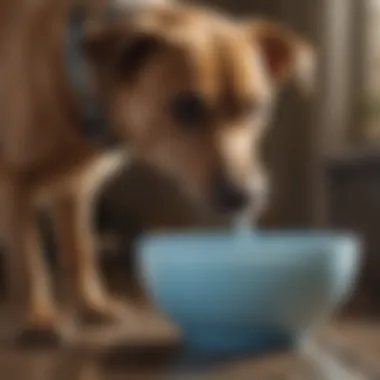Effective Strategies to Soothe Dog Diarrhea


Intro
Adopting a comprehensive understanding of the potential causes, home remedies, and the importance of nutrition and hydration is vital. With the right knowledge, pet owners can create a nurturing environment that aids in healing and prevents recurrence. Let's delve into the aspects that are central to addressing this common issue.
Understanding Dog Diarrhea
Understanding dog diarrhea is essential for all pet owners who wish to maintain the health and well-being of their canine companions. Diarrhea in dogs is not merely an inconvenience; it can signal underlying health issues, affect nutrition, and lead to dehydration. Being informed about this common ailment enables owners to take proactive measures in addressing the problem effectively.
By grasping the definition, symptoms, and possible causes of diarrhea, pet owners can react swiftly to their dog's needs. Early intervention can make a significant difference in recovery. This comprehension is not only beneficial for the dog’s immediate health but also helps avoid recurring issues, promoting a more robust digestive system long-term.
Definition and Symptoms
Dog diarrhea is characterized by more frequent and looser stools than normal. The condition may be acute, occurring suddenly, or chronic, lasting for a prolonged period. Common symptoms associated with diarrhea include:
- Increased frequency of bowel movements
- Loose or watery stools
- Straining or discomfort during defecation
- Possible presence of mucus or blood in the stool
- Vomiting or lethargy in some cases
Recognizing these symptoms early allows pet owners to assess whether their dog requires veterinary attention.
Common Causes
Identifying the underlying cause of diarrhea is crucial. Common causes include:
- Dietary changes: Sudden alterations in diet may upset the digestive system.
- Food intolerance or allergies: Some dogs may react negatively to specific ingredients in their food.
- Infections: Bacterial, viral, or parasitic infections can lead to gastrointestinal disturbances.
- Toxins: Ingesting harmful substances can induce diarrhea as a protective mechanism.
- Stress: Environmental changes or anxiety can also contribute to digestive upset.
Understanding these common triggers can guide owners in modifying their pet's environment and diet accordingly.
Types of Diarrhea
There are several types of diarrhea, and distinguishing among them can assist in determining the appropriate response. Here are the primary categories:
- Acute diarrhea: This is often sudden and may resolve within a few days. It usually does not require extensive treatment.
- Chronic diarrhea: Persisting for weeks, this type demands a thorough investigation to identify the root cause.
- Soft stool vs. watery diarrhea: Soft stools might indicate minor issues, while watery diarrhea usually signals a more severe condition.
- Hemorrhagic diarrhea: Characterized by blood in the stool, this type requires immediate veterinary attention.
Understanding these types aids in making informed decisions and addressing concerns with appropriate urgency.
Immediate Response Strategies
When a dog experiences diarrhea, the immediate response is crucial. Pet owners must act promptly to mitigate discomfort and avoid complications. This segment focuses on key immediate strategies that can help manage the situation effectively.
Monitoring Your Dog's Condition
Monitoring is a essential practice when your dog has diarrhea. It involves keeping a close eye on various signs and behaviors. Observe your dog's activity levels, appetite, and overall demeanor. Changes in these areas can indicate progress or deterioration.
Keep track of the frequency of bowel movements. Record any other symptoms, such as vomiting or lethargy. This information can be valuable when consulting with a veterinarian, as it helps provide a clear picture of your dog's condition.
Use tools like a temperature thermometer or simply feel the dog’s ears for temperature check. A normal body temperature for dogs typically ranges between 101°F and 102.5°F. If the temperature is outside this range, it may indicate a more serious issue.
Assessing Severity
Assessing the severity of diarrhea in dogs is another critical response. Not all cases are equal; some might be mild and resolve quickly, while others could signal significant health concerns.
Here are some factors to consider while assessing the severity:
- Duration: How long has the diarrhea lasted? A few hours may require home treatment, while more than 24 hours often calls for veterinary consultation.
- Blood in Stool: Presence of blood is a serious sign. It can suggest conditions like hemorrhagic gastroenteritis or internal injury.
- Hydration Status: Check for signs of dehydration, such as sunken eyes or dry gums. If the dog shows these signs, immediate veterinary intervention is necessary.
- Overall Behavior: Notice if your dog is acting unusually distressed. Signs of pain or distress, like whining or refusal to eat/drink, should not be ignored.


Keeping an organized record of all observations is recommended. This data helps in making informed decisions regarding the next steps.
"Proactive monitoring and assessment can significantly impact your dog's recovery and overall health during an episode of diarrhea."
Adhering to these immediate response strategies plays a pivotal role in effectively addressing dog diarrhea and ensuring your pet's swift recovery.
Home Remedies for Dog Diarrhea
Home remedies for dog diarrhea are essential in empowering pet owners to manage their canine's digestive distress effectively. They offer a range of options that are not only accessible but also often safe and beneficial for many dogs. Choosing the right home remedy can facilitate recovery, reduce stress for both the pet and owner, and potentially prevent the need for more invasive medical treatments. Understanding these remedies provides pet owners with tools to support their furry companions during challenging times.
Fasting Your Dog
Fasting is a simple yet effective initial response to dog diarrhea. Typically, a dog’s digestive system may need a break to recover from an upset. By withholding food for approximately 12 to 24 hours, the gastrointestinal tract can rest and heal. It is crucial to continue offering fresh water to prevent dehydration during this fasting period.
However, it is important to note that this approach may not be suitable for puppies or very young dogs; they require regular food intake due to their smaller bodies. Always observe the dog's water intake and general well-being during this time. If diarrhea persists for over a day, consulting a veterinarian is advisable.
Introducing a Bland Diet
After the fasting period, reintroducing food through a bland diet can be beneficial. This diet aids in easing the digestive process and minimizing irritation in the gut. Two popular options within a bland diet include rice and chicken, and canned pumpkin.
Rice and Chicken
Rice and chicken is a widely recommended bland diet due to its simple ingredients and digestibility. The combination provides easily digestible carbohydrates from the rice and lean protein from the chicken.
Key characteristic: This dish is low in fat and gentle on the stomach, making it an ideal choice while managing dog diarrhea.
Unique feature: Because it is hypoallergenic, rice and chicken can be suitable for dogs with food sensitivities or allergies.
Advantages:
- Easily digestible: Lowers the chance of further gastrointestinal upset.
- Nutritional balance: Provides essential nutrients and energy needed for recovery.
Disadvantages:
- Lack of variety: This diet should be a temporary solution and not a long-term routine as it lacks complete nutrition.
Canned Pumpkin
Canned pumpkin is another beneficial addition to a dog's diet during diarrhea. It is rich in soluble fiber which helps to bulk up the stool and normalize bowel movements.
Key characteristic: The high fiber content in canned pumpkin can effectively absorb excess water in the intestines.
Unique feature: This ingredient is low in calories and packed with vitamins, contributing positively to a dog's overall health.
Advantages:
- Ease symptoms: Reduces the frequency of loose stools and supports digestive health.
- Nutritional benefits: Provides important nutrients such as vitamins A, C, and E.
Disadvantages:
- Overconsumption risk: Too much could lead to constipation; moderation is key.
Probiotics and Supplements


Utilizing probiotics and supplements is another valuable method to support a dog's recovery from diarrhea. Probiotics contain beneficial bacteria that can restore gut flora balance, potentially speeding up recovery.
Many products are available specifically tailored for pets, including powdered forms that can be mixed with food or chews that act as treats. Always select probiotic supplements that are designed for dogs to ensure safety and effectiveness.
Importance of Hydration
Hydration is an essential element in managing dog diarrhea. When a dog experiences diarrhea, they lose a substantial amount of fluids and electrolytes, which can lead to dehydration. This condition can worsen a dog's overall health and can even become life-threatening if left unaddressed. Proper hydration helps to maintain normal body functions and supports recovery by restoring the lost fluids and minerals. Therefore, ensuring your dog stays hydrated during such episodes is critical.
Monitoring your dog's fluid intake and addressing dehydration promptly can significantly improve their recovery process. Understanding the signs of dehydration and knowing how to effectively rehydrate your pet are vital components in the management of diarrhea.
Signs of Dehydration
Recognizing the signs of dehydration in dogs is crucial for timely intervention. Common indicators include:
- Dry or sticky gums
- Loss of skin elasticity—when you pinch the skin, it may not return quickly to normal
- Sunken eyes
- Lethargy or weakness
- Decreased urination or dark-colored urine
Remember, if you notice any of these symptoms, it is important to act quickly as dehydration can escalate rapidly in dogs, particularly in puppies or elderly pets.
Rehydration Solutions
To rehydrate a dog suffering from diarrhea, several solutions are available. These can range from commercial products to homemade options.
Electrolyte Solutions
Electrolyte solutions are specially formulated liquids that contain necessary minerals like sodium, potassium, and chloride. These solutions are beneficial because they help restore the balance of fluids and electrolytes that may be lost during episodes of diarrhea. A key characteristic of electrolyte solutions is their ability to provide immediate hydration as the components work rapidly to restore balance.
Brands such as Pedialyte are commonly recommended for dogs, mixed with water can create a palatable solution for your pet. The main advantage of using commercially available electrolyte solutions is their precise formulation, which optimally meets the hydration needs of dogs. However, they may sometimes contain added sugars or artificial flavors, which should be monitored.
Homemade Rehydration Options
Homemade rehydration options can be an effective way to ensure your dog gets the necessary fluids and minerals without relying solely on commercial products. A simple mixture of water and salt can provide essential electrolytes. Typically, mixing one teaspoon of salt and one tablespoon of sugar into a quart of water can create a suitable solution.
The key feature of homemade options is their accessibility and cost-effectiveness, as they can be made with common kitchen ingredients. While these mixtures can effectively rehydrate, it is important to ensure that they are balanced. Monitoring the amount of salt used is essential since too much can further exacerbate health issues.
Ultimately, hydration plays a pivotal role in supporting a dog’s health during diarrhea episodes. Emphasizing the importance of recognizing dehydration signs, along with utilizing effective rehydration solutions, will enhance recovery and promote optimal well-being.
Veterinary Consultation
Veterinary consultation is a critical component in managing dog diarrhea. Understanding when to seek professional help can significantly impact your dog's health and recovery process. While many cases of diarrhea can be resolved at home with proper care, there are situations where veterinary expertise is necessary. It is important for pet owners to recognize these instances to prevent further complications.
When diarrhea persists for more than a day or two, it signals the need for a thorough evaluation. Other concerning signs include vomiting, lethargy, or blood in the stool. These symptoms may indicate underlying conditions that require specialized treatment. Early consultation can lead to quicker recovery times and prevent escalation of health issues. Moreover, prompt attention can spare your pet the distress and discomfort associated with unresolved digestive problems.
In addition, a veterinarian can provide access to diagnostic procedures and tailored treatment options while ensuring your dog's overall wellbeing. Engaging in a veterinary consultation can also equip you with valuable knowledge on maintaining your pet's health in the long run.
When to Seek Help
Recognizing the signs that require a visit to the vet is crucial. If your dog exhibits persistent diarrhea for over 24 to 48 hours, it is advisable to consult a veterinarian. Signs that warrant immediate attention include:
- Persistent vomiting along with diarrhea.
- Blood in the stool or black tarry feces.
- Signs of dehydration such as excessive thirst, dry gums, or appearance of lethargy.
- Sudden onset of diarrhea that seems linked to recent dietary changes.
- Significant behavior changes, including weakness or unresponsiveness.


Taking timely action can be the difference between a minor issue and a serious health concern.
Diagnostic Procedures
In the quest for diagnosing the cause of diarrhea, two common procedures are stool tests and blood tests. Both play an integral role in assessing your dog's health and guiding treatment.
Stool Tests
Stool tests are essential for detecting parasites, bacteria, and other abnormalities in a dog's digestive system. This procedure is especially valuable because it can uncover infections that may not be immediately apparent through symptoms alone. The primary characteristic of stool tests is their non-invasive nature, making them a commonly recommended choice for evaluating canine diarrhea.
A unique feature of stool tests is their ability to identify specific parasites. They provide a clear insight into whether a parasitic infection is the root of the digestive discomfort. While the test is generally straightforward, it has limitations. It may not detect all parasites or bacterial infections, as the presence of these pathogens can vary in fecal samples. However, even with these limitations, stool tests remain a fundamental diagnostic tool in veterinary practice.
Blood Tests
Blood tests serve another critical purpose in diagnosing health issues related to diarrhea. Unlike stool tests, blood tests assess the overall health of your dog by measuring blood cell counts, organ function, and electrolyte levels. The key characteristic of blood tests lies in their ability to provide a holistic view of your dog's health.
A unique feature of blood tests is their capacity to reveal underlying conditions that may contribute to diarrhea. This might include pancreatitis, liver disease, or kidney issues. While blood tests require a more invasive approach than stool tests, the information gathered can be invaluable in guiding treatment strategies. However, blood tests may not pinpoint the exact cause of diarrhea, making them a complementary action rather than a stand-alone solution.
Ultimately, both diagnostic procedures play important roles in understanding and addressing dog diarrhea. Engaging in these tests when appropriate can lead to better medical insights and targeted treatments.
Preventive Measures
Preventive measures play a crucial role in managing dog diarrhea. By taking proactive steps, pet owners can significantly reduce the chances of their dogs experiencing digestive distress. It is imperative to recognize that not all diarrhea is preventable, but many instances can be mitigated through careful attention to diet and health. Implementing good practices fosters a healthier environment for dogs.
Dietary Considerations
Diet is perhaps the most vital factor in preventing dog diarrhea. A consistent and balanced diet is essential for maintaining optimal gut health. Here are some key aspects to consider:
- High-Quality Food: Use dog food that meets the standards set by the Association of American Feed Control Officials (AAFCO). Avoid frequent changes in brands or formulas, as this can upset a dog's stomach.
- Avoid Human Food: Dogs should not consume human food, especially rich or spicy dishes. Ingredients like chocolate, grapes, and onions can be toxic and induce diarrhea.
- Introduce New Foods Gradually: When changing your dog's diet or introducing new treats, do so slowly over 7 to 10 days. This helps the gastrointestinal system adapt without adverse reactions.
- Monitor for Allergens: Some dogs may develop sensitivities or allergies to specific ingredients. Keep an eye on their reactions and consult with a veterinarian if you suspect an intolerance.
Incorporating these dietary strategies can help safeguard your dog's digestive health and reduce the likelihood of future diarrhea episodes.
Regular Veterinary Check-Ups
Routine veterinary check-ups are essential for early detection and prevention of potential health issues, including diarrhea. Regular visits, at least once a year for healthy dogs and more often for those with pre-existing conditions, can catch problems before they worsen. Key advantages include:
- Preventive Screenings: This allows veterinarians to assess overall health and identify any underlying issues, like parasites or infections, that could lead to gastrointestinal upset.
- Vaccination Updates: Keeping vaccines current helps protect dogs from diseases that can cause severe health problems, including diarrhea.
- Professional Dietary Advice: Veterinarians can provide tailored dietary recommendations based on your dog's specific health needs and lifestyle.
Being proactive with veterinary appointments can aid in maintaining your dog's well-being and potentially avert instances of diarrhea.
"A preventive approach minimizes health risks, ensuring a longer, healthier life for your dog."
By prioritizing dietary considerations and regular veterinary visits, pet owners can cultivate an environment that promotes good digestive health and reduces the risk of diarrhea episodes.
The End
Reinforcing Good Practices
Good practices play a fundamental role in managing a dog's digestive health. Regular feeding schedules with appropriate portions prevent gastrointestinal upset. Furthermore, avoid sudden diet changes. Instead, transition gradually to new foods. This allows a dog's digestive system to adapt smoothly. Keeping fresh water available at all times is essential. Hydration is key for recovery if a dog experiences diarrhea. Also, familiarizing oneself with common triggers like certain foods or environmental changes can help in making informed decisions to safeguard health.
Monitoring your dog’s weight can also provide insights into their health. Any rapid loss can be a warning sign of underlying issues. If these cautionary signs are observed, contacting a veterinarian is advisable. Taking proactive steps can ensure a more resilient digestive system, helping to avert future episodes of diarrhea.
Final Thoughts on Canine Digestive Health
A dog’s digestive health reflects overall well-being. By understanding the potential causes of diarrhea and responding appropriately, pet owners can foster a healthier environment. Equip yourself with knowledge about hydration and nutrition to support recovery effectively. Feed your dog appropriate meals and regularly review their dietary needs to avoid issues.
Engaging in routine veterinary check-ups ensures that any health concerns are addressed timely. Digestive problems can sometimes indicate more serious conditions. Therefore, establishing good rapport with a veterinary professional can also help in navigating these challenges. These steps contribute not only to a better quality of life for dogs but also to lasting bonds between pets and their owners.
"A proactive approach towards your dog's health can prevent many problems down the road."
By emphasizing knowledge, good practices, and veterinary support, you equip yourself to handle your dog's health challenges more effectively.



